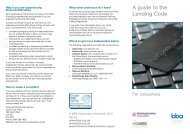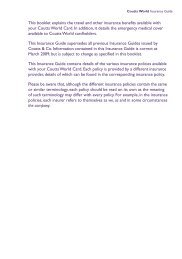The Million Pound Donors Report 2011 - Coutts
The Million Pound Donors Report 2011 - Coutts
The Million Pound Donors Report 2011 - Coutts
Create successful ePaper yourself
Turn your PDF publications into a flip-book with our unique Google optimized e-Paper software.
case study: Marie curie cancer care<br />
AppendiCES | the million pound donors report <strong>2011</strong><br />
CASE STUDY:<br />
MARIE CURIE CANCER CARE<br />
MILLION POUND DONOR<br />
Appendix: How to make a<br />
million pound donation<br />
Lucy Sargent is Head of Major Gifts at Marie Curie<br />
Cancer Care, which was founded in 1948 and is one<br />
of the UK’s leading charity’s supporting people with<br />
cancer and other terminal illnesses. Marie Curie’s<br />
vision is that everyone will have the high quality care<br />
and support they need at the end of their life in the<br />
place of their choice.<br />
“In the last fifteen years we have had four donors that have<br />
made million pound donations. Two of them were one-off<br />
donations from individuals of exactly £1 million each, and<br />
the other two were a trust and a family foundation whose<br />
lifetime value, over a couple of decades, cumulatively<br />
exceeds a million pounds.<br />
Our most recent million pound donor is a northern<br />
entrepreneur. We got to know him when he paid the costs<br />
for someone he knew to undertake a challenge expedition<br />
to raise funds for Marie Curie. He was aware of our work<br />
and had some experience of cancer in his family, which<br />
meant there was some resonance from the start.<br />
Step by step we were able to introduce him to our work<br />
through meetings and events. As we got to know him<br />
better we understood that he was interested in funding<br />
work within his own community; he wanted to make sure<br />
his money stayed local to where he lived. We sent him<br />
some information on a project that we wanted to establish<br />
in his area and we had a face-to-face meeting, but it was<br />
during a telephone call that he confirmed the gift, saying<br />
“I’m going to give you a one-er”. We weren’t exactly sure<br />
what a ‘one-er’ was, so we said, “Can you tell us what that<br />
means” and he replied, “I’m going to give you a million<br />
pounds!” I remember it was unbelievably exciting in the<br />
office because we hadn’t had a gift of that size for quite<br />
some time. <strong>The</strong> news quickly spread across the charity<br />
accompanied by huge and genuine joy at the knowledge<br />
that this gift would do so much for patients and families.<br />
We’d only recently established our major donor programme<br />
and there was some doubt within the charity as to whether<br />
we would be able to raise very large sums because we are a<br />
very broad base organisation, which historically has<br />
received lots of small donations from a large number of<br />
modest donors. So it was fantastic to learn that our charity<br />
can attract that kind of support. It was a clear sign that we<br />
were capable and ready to attract major donors. It gave us<br />
the confidence to think big in terms of our fundraising.<br />
After the initial euphoria, it took nine months before the<br />
money came in. We almost started to worry but we later<br />
learnt that he was waiting to maximise the tax relief, which<br />
changed in the tax year ahead. When the money came<br />
through as a BACS payment there was a second wave of<br />
euphoria. We passed the bit of paper around the office<br />
and said, “Look how many noughts there are! Isn’t this<br />
absolutely amazing, it will fund so much of our wonderful<br />
work”. For the project team on the ground it was fantastic<br />
for them to know there was someone out there who<br />
believed in their work enough to fund it so generously.<br />
We always try to have a conversation early on with our<br />
donors to find out how they want to work with us. We<br />
are happy for the relationship to be led by the donors<br />
because we want to be sure that they are getting enough<br />
information and that they are getting the right kind of<br />
information. For example, one of our million pound donors<br />
doesn’t want to meet us or come to any events, he just<br />
wants reasonably regular reports about how we’re using his<br />
money. Nor does he want any recognition, he is happy to<br />
know that the charity is doing good work and is helping<br />
people. But we have much closer relationships with some<br />
of our other donors who we meet regularly and invite to<br />
lunch with the chief executive. We have also provided<br />
naming opportunities to a seven figure donor. All our major<br />
donors have access to our leadership at any time, and are<br />
offered annual meetings with front line workers, such as<br />
our nurses, because we appreciate they don’t only want to<br />
meet the fundraising staff.<br />
It is difficult to know when it is appropriate to ask a big<br />
donor for another gift. Challenge grants can help to create<br />
opportunities to ask, for example we were offered £30,000<br />
but needed to find a match to unlock it. We explained that<br />
situation to one of our biggest donors, and they kindly<br />
agreed to make an additional gift that year so we could<br />
meet the challenge.<br />
Major donors are incredibly important, they help us to<br />
trailblaze and look at new and different ways of doing<br />
things. <strong>The</strong>y enable us to test and trial different ways of<br />
working and tackling the big issues facing our society, for<br />
example the current demographic changes are creating<br />
huge challenges in health care.<br />
<strong>The</strong> charity sector is very effective at innovation and<br />
finding ways to solve problems. Philanthropists are the<br />
people who help to fuel that innovation, making change<br />
possible within Marie Curie and other charities.”<br />
When we spoke to donors and charities, we asked them to share their ‘top tips’ on giving and receiving donations worth<br />
£1 million or more. Here’s what they said:<br />
Advice for donors<br />
“If you are comfortable to do so, work with the charity<br />
to make a public announcement about your donation.<br />
‘Going public’ can help to raise the profile of the<br />
organisation and encourage other donors to come<br />
forward.”<br />
“Don’t make unreasonable demands of the charities<br />
you support. <strong>The</strong> feedback you request should be<br />
proportionate to the size of your gifts and should not<br />
go on for years after the money has been spent.”<br />
“Think about your philanthropy as a way of educating<br />
your children – it can help them learn how to handle<br />
the responsibilities that come with inheriting wealth.”<br />
“Make donations that will transform the organisations<br />
you care about. Think about how your contribution<br />
can have the biggest effect over the longest time<br />
period – that probably means supporting the charity’s<br />
capacity building rather than simply funding a<br />
building or a project.”<br />
“Try to stick with a charity or a cause for a long time<br />
instead of making lots of short-term grants to many<br />
different organisations.”<br />
“Give something back to the people and places that<br />
have helped to create your wealth.”<br />
“Be prepared to fund campaigns as well as more<br />
tangible things. If the campaign is a success then your<br />
money will have a massive and long-lasting impact.”<br />
Advice for charities<br />
“Take your time and ask at the right time. It can take<br />
three or four years before a donor is ready to make a<br />
really significant financial commitment.”<br />
“Find out what benefits the donor would be pleased to<br />
get, as they are not always obvious or that difficult to<br />
fulfil. We give one major donor an annual staff car<br />
parking pass and he is delighted with it.”<br />
“Be prepared to give major donors access to the people<br />
within the charity that they want to speak to,<br />
including the most senior staff who can talk about<br />
strategy and the front-line workers who can explain<br />
what is happening on the ground.”<br />
“Major donors will rarely ask for formal<br />
acknowledgement, like naming opportunities, but<br />
they usually appreciate being asked.”<br />
“Involve your major donors as much as is appropriate.<br />
<strong>Million</strong> pound gifts come about because someone is<br />
passionate about what you do, so give them every<br />
opportunity to enjoy their passions.”<br />
“<strong>The</strong> bigger the donation, the more reassurance the<br />
donor usually needs. Give them every reason to trust<br />
you and believe their money will be well spent for<br />
maximum effect.”<br />
32 33


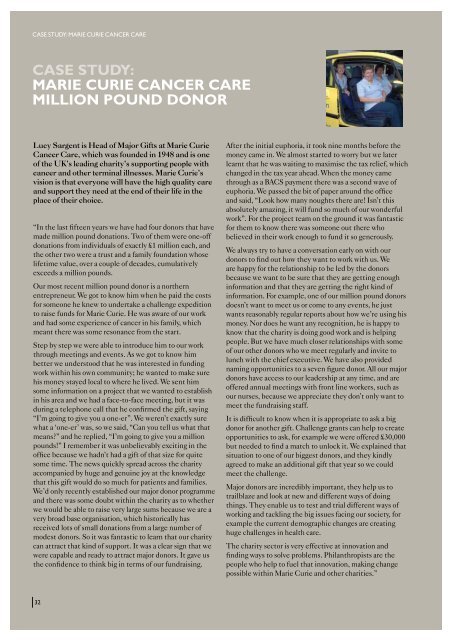
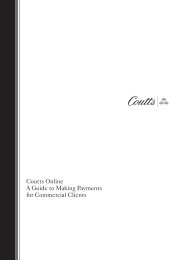
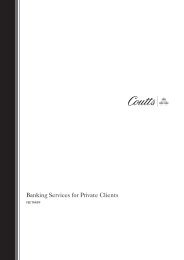
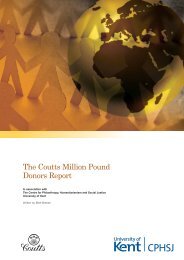
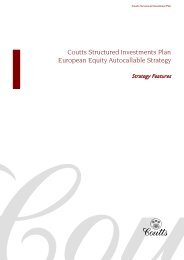
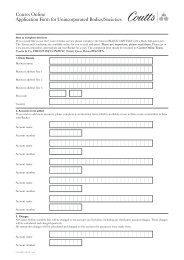


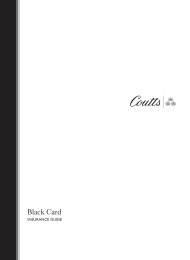
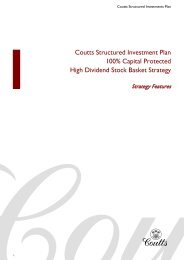
![[PDF] Governance in the Family Business - Coutts](https://img.yumpu.com/36912267/1/184x260/pdf-governance-in-the-family-business-coutts.jpg?quality=85)
